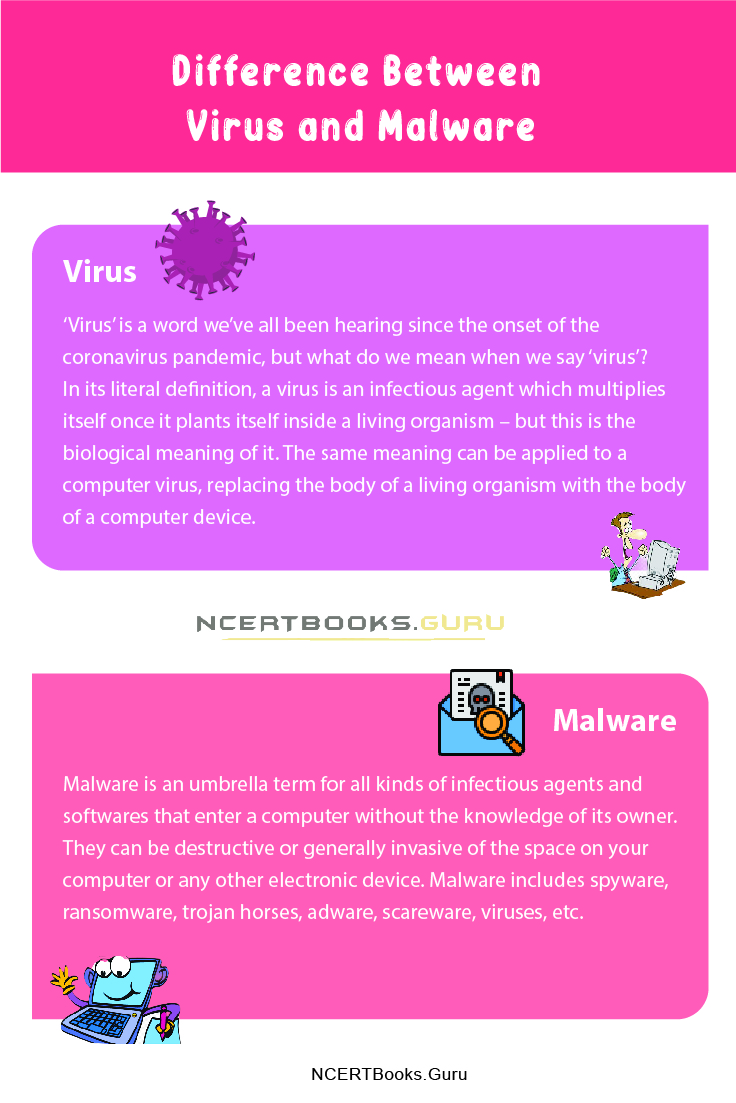Virus and malware are both infections that can affect your computer as seriously as damaging your files and hard drives to something simple like slowing down your computer or other glitches. So, malware and virus can be highly harmful for the files on your computer or just mildly annoying. Either way, we must protect ourselves from the same. Let’s take a look at what virus and malware refer to in specific, and then we will look at the difference between virus and malware.
You can also find differences between articles on various topics that you need to know. Just tap on the quick link available and get to know the basic differences between them.
What Is the Difference Between Virus and Malware?
Virus
‘Virus’ is a word we’ve all been hearing since the onset of the coronavirus pandemic, but what do we mean when we say ‘virus’? In its literal definition, a virus is an infectious agent which multiplies itself once it plants itself inside a living organism – but this is the biological meaning of it. The same meaning can be applied to a computer virus, replacing the body of a living organism with the body of a computer device. Therefore, on its own, a virus cannot do anything significant, but once it enters a computer system, it has the power and ability to destroy the computer internally. However, not all viruses are destructive viruses, as mentioned before, where some of them only inconvenience you more than anything else.
Malware
Malware is an umbrella term for all kinds of infectious agents and softwares that enter a computer without the knowledge of its owner. They can be destructive or generally invasive of the space on your computer or any other electronic device. Malware includes spyware, ransomware, trojan horses, adware, scareware, viruses, etc.
Spyware is malicious software which invades your device and passes on data such as your files and other information on to the internet or to other users who will benefit from it. Ransomware refers to a total hijacking of your computer by either threatening to leak all of your personal data online or blocking your own access to your data, unless a ransom is paid to the hacker. Adware keeps on filling up your screen with unwanted ads, and scareware comes in the form of pop-ups to scare users into believing that they need to download some kind of anti-virus software on their device – it is a method of using scare tactics to coerced users into buying products they otherwise needn’t buy.
All malware can be downloaded off spam and scam websites, trojan horse viruses (these come disguised as legitimate apps or softwares but actually release a virus upon download) or even through malicious emails. Today, malware can even be transported through wi-fi signals if you are on a public network and choose to allow others to access your files.

Difference Between Virus and Malware
As mentioned before, viruses are a form of malware. So, essentially the difference between virus and malware is that viruses are a part of malware. What comes under malware is spyware, ransomware and viruses, all of which are malicious software or dangerous agents.
The difference is that virus has biological connotations as well, while using the same principle of multiplying to deteriorate an organism. As mentioned before, the same can be applied to electronic devices, through malicious software or agents, using something like a trojan horse virus, to deteriorate a device or server. In the simplest of terms, to describe the difference between virus and malware, we can say that all viruses are malware, but not all malware is virus.